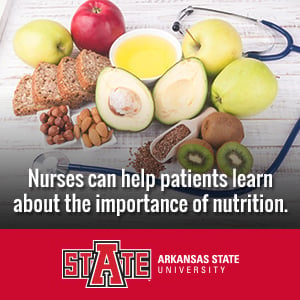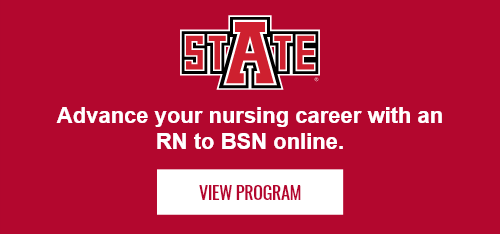
Proper nutrition plays a big role in disease prevention, recovery from illness and ongoing good health. A healthy diet will help you look and feel good as well. Since nurses are the main point of contact with patients, they must understand the importance of nutrition basics and be able to explain the facts about healthy food choices to their patients. Nutrition classes provide the information necessary to sort the fact from fiction about healthy eating and pass that knowledge on to their patients. Not only must nurses be able to explain the ins and outs of a healthy diet, they must also lead by example.
How Does Nutrition Relate to Health?
Healthy food choices are vital to preventing illness, particularly chronic illnesses such as diabetes and heart disease. Nurses work in a variety of healthcare settings, not just hospitals. While nurses in hospitals may focus more on the dietary concerns of patients recovering from illnesses, community nurses focus more on prevention. Nurses who work at schools or community centers can often provide nutritional education to the public to prevent chronic conditions.
One fact about healthy eating that a nurse may provide is how a high sugar diet may cause type 2 diabetes. Nutrition for diabetics is crucial. According to diabetes.org, “One of the biggest risk factors for type 2 diabetes is being overweight, and a diet high in calories from any source contributes to weight gain.” Of course, eating candy is probably a quicker way to obesity (and type 2 diabetes) than whole grains or fish. It is important that nurses understand proper nutrition as it relates to recovery as well.
Proper nutrition is not only important for preventing disease, it is also crucial to the recovery process. According to an article by Michael Henning titled “Nursing’s Role in Nutrition,” “The healing of the body can take place only when the nutrients that provide the building blocks for repair are present.” Due to the lack of trained nutritionists, the responsibility of educating patients on healthy eating habits often falls to attending nurses. They can put together diet plans for patients to take home and use long after they leave the hospital. According to the British magazine Saga, protein is essential to the healing process: “Fats and carbohydrates are also important in helping wounds to heal. They stop your body from using protein as an energy source, allowing it to be used to heal tissue.”
Not only should people recovering from illness make sure they eat right, they also need to make sure they are eating enough. Many illnesses and treatments can cause a loss of appetite — including anything from a common cold to chemotherapy. Weight loss can increase your chances of infection, notes Victoria Taylor, a dietician with the British Heart Foundation. Taylor suggests “having more frequent meals, or little snacks throughout the day.”
How Can Nurses Teach Patients About a Healthy Diet?
There are many ways nurses can teach their patients about proper nutrition as it relates to their health. Presentations at community health centers are crucial to community health. A nurse with the right knowledge can prepare a PowerPoint presentation to show for a group of seniors during a health fair. They can also give the attendees literature to take home for further study and guidance. Similarly, a school nurse can present students with the facts about healthy nutrition during a school assembly as well as giving them brochures to take home.
Nurses who work in hospitals and clinics are likely more concerned with nutrition as it relates to recovery from illness, surgery or other treatments. Nurses can talk to patients at the bedside and explain the special meals they have at the hospital that aid recovery, as many patients will be on special diets during their stay. These nurses can also gather informative and accurate literature to give patients when they are discharged. Healthy eating goes far beyond the hospital, especially if the patient plans to stay out of the hospital.
Lead By Example (Practice What You Preach)
According to an article titled “Healthy Eating for Healthy Nurses: Nutrition Basics to Promote Health for Nurses and Patient” published in The Online Journal of Issues in Nursing, “When healthcare professionals, such as nurses, care for their own health, it is reasonable to think that this will help them to better care for patients.” Nurses often find themselves working a mixed schedule — nightshifts for a few days and then a dayshift a day or two later. Add to that the stress of the job itself, and poor food choices may become the norm. Patients, who are likely getting information about nutrition from their nurses, are likely to be aware of the “health habits” of those nurses. As noted in The Online Journal of Issues in Nursing article, “@patients were more confident to receive diet and exercise education from a normal weight nurse.” As you can see, the importance of nutrition is clear from both sides on the healthcare equation.
Opportunities for Nurses in Nutrition Education and Jobs
There are not enough dieticians or licensed nutritionists to meet the needs of the population, which is one of the reasons it is important for nurses to be able to fill those gaps. Unfortunately, nutrition classes are often not mandatory in nursing school, though some classes may cover it as a part of a larger seminar. Arkansas State’s online RN to BSN program, on the other hand, includes a co-requisite course called Basic Human Nutrition. This nutrition class covers the “basic concepts of nutrition including many factors that have an impact upon nutritional practices.”
The RN to BSN program at A-State will give working RNs the advanced knowledge and skills they need to thrive in the ever-changing healthcare landscape. Many healthcare facilities now require potential hires to have a BSN, and BSNs are more likely to advance into leadership roles. Ranked as one of the best universities in the South by U.S. News & World Report in 2015, A-State is a perfect choice for RNs who want to continue working while earning their BSNs completely online.
Learn more about the Arkansas State online RN to BSN program.
Sources:
Lippincott NursingCenter: Nursing’s Role in Nutrition
Healthline: 27 Health and Nutrition Tips That Are Actually Evidence-Based
American Heart Association: Nutrition Basics

